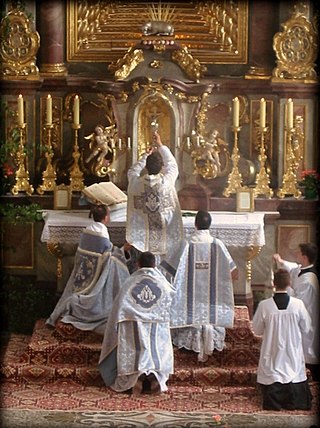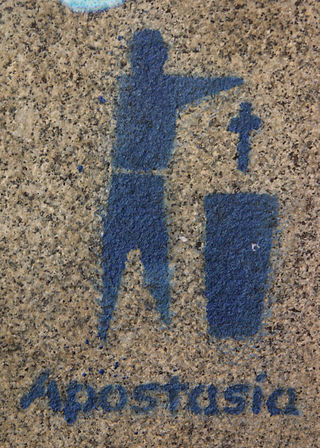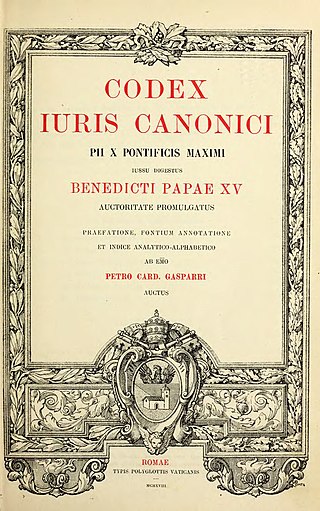
Traditionalist Catholicism is a movement encompassing members of the Catholic Church and offshoot groups of the Catholic Church that emphasizes beliefs, practices, customs, traditions, liturgical forms, devotions and presentations of teaching associated with the Catholic Church before the Second Vatican Council (1962–65). Traditionalist Catholics particularly emphasize the Tridentine Mass, the Roman Rite liturgy largely replaced in general use by the post-Second Vatican Council Mass of Paul VI.

An acolyte is an assistant or follower assisting the celebrant in a religious service or procession. In many Christian denominations, an acolyte is anyone performing ceremonial duties such as lighting altar candles. In others, the term is used for one who has been inducted into a particular liturgical ministry, even when not performing those duties.
In law, motu proprio describes an official act taken without a formal request from another party. Some jurisdictions use the term sua sponte for the same concept.
Ecclesia Dei is the document Pope John Paul II issued on 2 July 1988 in reaction to the Ecône consecrations, in which four priests of the Society of Saint Pius X were ordained as bishops despite an express prohibition by the Holy See. The consecrating bishop and the four priests consecrated were excommunicated. John Paul called for unity and established the Pontifical Commission Ecclesia Dei to foster a dialogue with those associated with the consecrations who hoped to maintain both loyalty to the papacy and their attachment to traditional liturgical forms.
Quattuor abhinc annos is the incipit of a letter that the Congregation for Divine Worship and the Discipline of the Sacraments sent on 3 October 1984 to presidents of episcopal conferences concerning celebration of Mass in the Tridentine form.
The Pontifical Commission Ecclesia Dei was a commission of the Catholic Church established by Pope John Paul II's motu proprioEcclesia Dei of 2 July 1988 for the care of those former followers of Archbishop Marcel Lefebvre who broke with him as a result of his consecration of four priests of his Society of St. Pius X as bishops on 30 June 1988, an act that the Holy See deemed illicit and a schismatic act. It was also tasked with trying to return to full communion with the Holy See those traditionalist Catholics who are in a state of separation, of whom the Society of Saint Pius X (SSPX) is foremost, and of helping to satisfy just aspirations of people unconnected with these groups who want to keep alive the pre-1970 Roman Rite liturgy.
Inter pastoralis officii sollicitudines was a motu proprio issued 22 November 1903 by Pope Pius X that detailed regulations for the performance of music in the Roman Catholic Church. The title is taken from the opening phrase of the document. It begins: "Among the concernsof the pastoral office, ... a leading one is without question that of maintaining and promoting the decorum of the House of God in which the august mysteries of religion are celebrated...." The regulations pointed toward more traditional music and critiqued the turn toward modern, orchestral productions at Mass.
In the Catholic Church, a secular institute is one of the forms of consecrated life recognized in Church law.
A secular institute is an institute of consecrated life in which the Christian faithful living in the world strive for the perfection of charity and work for the sanctification of the world, especially from within.

A formal act of defection from the Catholic Church was an externally provable juridic act of departure from the Catholic Church that existed between 1983 and 2010.
Summorum Pontificum is an apostolic letter of Pope Benedict XVI, issued in July 2007. This letter specifies the circumstances in which priests of the Latin Church could celebrate Mass according to what Benedict XVI called the "Missal promulgated by Blessed John XXIII in 1962" and administer most of the sacraments in the form used before the liturgical reforms that followed the Second Vatican Council.
Pope Pius XII apostolic constitutions and bulls includes a listing of all apostolic constitutions and papal bulls issued by Pope Pius XII (1939-1958):

The 1917 Code of Canon Law, also referred to as the Pio-Benedictine Code, is the first official comprehensive codification of Latin canon law.

The 1983 Code of Canon Law, also called the Johanno-Pauline Code, is the "fundamental body of ecclesiastical laws for the Latin Church". It is the second and current comprehensive codification of canonical legislation for the Latin Church of the Catholic Church. The 1983 Code of Canon Law was promulgated on 25 January 1983 by John Paul II and took legal effect on the First Sunday of Advent 1983. It replaced the 1917 Code of Canon Law which had been promulgated by Benedict XV on 27 May 1917.
Omnium in mentem is the incipit of a motu proprio of 26 October 2009, published on 15 December of the same year, by which Pope Benedict XVI modified five canons of the 1983 Code of Canon Law, two concerning the sacrament of holy orders, the other three being related to the sacrament of marriage.
Provida Mater Ecclesia was an apostolic constitution by Pope Pius XII, that recognized secular institutes as a new form of official consecration in the Catholic Church.
Cum Sanctissimus was an instruction issued on March 19, 1948, by the Sacred Congregation for Religious and Secular Institutes of the Catholic Church. The instruction clarified specific issues with respect to the approving religious institutes.
The Catholic Church utilizes the oldest continuously functioning legal system in the West, much later than Roman law but predating the evolution of modern European civil law traditions. The history of Latin canon law can be divided into four periods: the jus antiquum, the jus novum, the jus novissimum and the Code of Canon Law. In relation to the Code, history can be divided into the jus vetus and the jus novum. Eastern canon law developed separately.
Pious association or pious union in the canon law of the Roman Catholic Church is the legal concept that describes an organization of Catholic persons, approved by the local ordinary, engaged in the practice of the spiritual and corporal works of mercy in the name of and in accordance with the teachings of the Church.
Traditionis custodes is an apostolic letter issued motu proprio by Pope Francis, promulgated on 16 July 2021 regarding the continued use of pre-Vatican II rites. It restricts the celebration of the Tridentine Mass of the Roman Rite, sometimes colloquially called the "Latin Mass" or the "Traditional Latin Mass". The apostolic letter was accompanied by an ecclesiastical letter to the Catholic bishops of the world.






